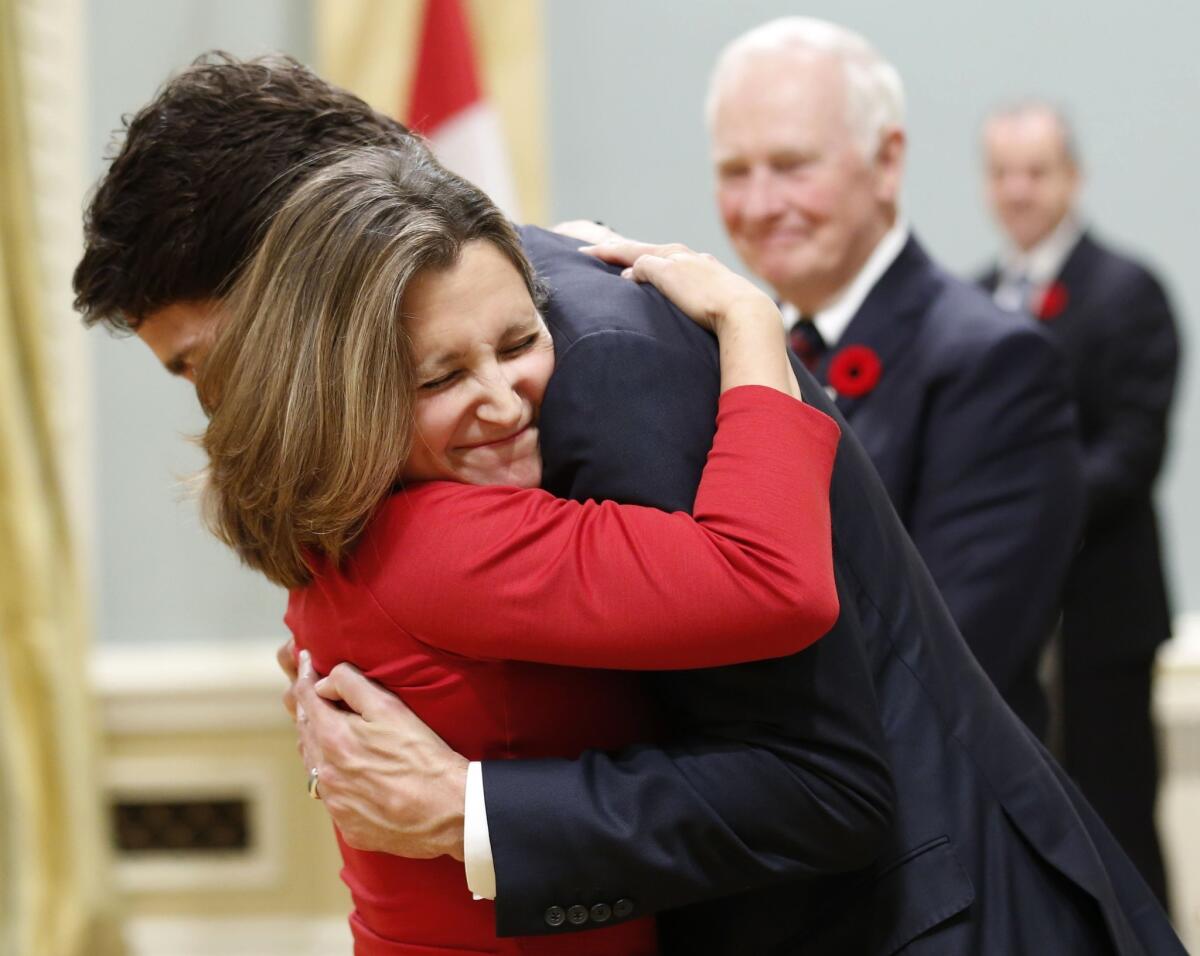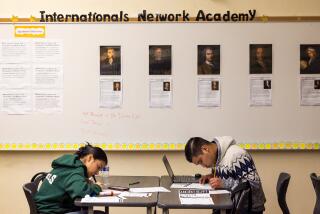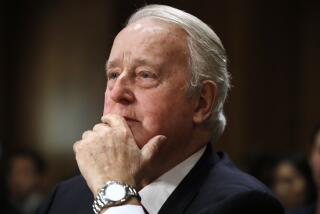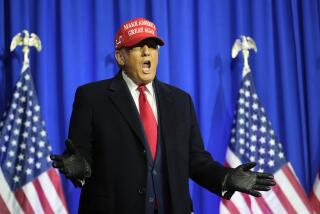Column: Can Canada show us how to fix income inequality? A talk with International Trade Minister Chrystia Freeland

Canada’s new International Trade Minister, Chrystia Freeland, left, is congratulated by Prime Minister Justin Trudeau after the Liberal Party victory on Nov. 4.
There must be few government ministers anywhere in the Western world better prepared to address issues of economic growth and income inequality than Chrystia Freeland. Now 47, she served as a Moscow bureau chief, Eastern European correspondent and editor in several capacities at the Financial Times — and many other journalistic posts — before leaving journalism in 2013 to run successfully for a seat in the Canadian parliament.
Freeland was named Minister for International Trade by the country’s new prime minister, Justin Trudeau, after his Liberal Party was swept into power Nov. 4 on a frankly progressive economic platform. Americans transfixed by our own seemingly endless political campaign were barely aware of the thunderclap taking place on our northern border, where Trudeau ended the nearly 10-year Conservative government of Stephen Harper.
It is really important not to see this concern with the hollowed-out middle class as being in any way anti-entrepreneurship, anti-economic success, anti-innovation.
— Chrystia Freeland, Canadian minister of international trade
“We campaigned very much on a middle-class prosperity agenda, and we were very open about the fact that income inequality has been increasing and we have to do something about it,” Freeland told me Friday, during a brief stopover in Los Angeles on her way home from the Asia Pacific Economic Cooperation meeting in Manila.
The new Liberal government’s program includes a tax increase on the wealthiest Canadians, to be used to give the middle class a tax cut and to fund a child credit for the working class. The country’s top marginal rate, applied to incomes over $200,000 Canadian (about $150,000 U.S.), will rise to 33% from 29%. Middle-class families with incomes between $44,701 and $89,401 ($33,505 to $67,010 U.S.) will receive an effective tax cut of 7%.
Working-class families would get a child credit starting at about $6,000 per child ($4,500 U.S.) for the lowest-income family and ratcheting down for families higher on the income ladder.
“That’s enough to lift a child out of poverty,” Freeland said, adding that it’s based on the principle that “one of the most effective ways to help poor people is to give them more money.”
A third major element of the program is a surge in infrastructure spending, more than doubling the national construction budget to about $125 billion over 10 years, much of it devoted to affordable housing. Freeland’s party has absorbed a couple of lessons that seem difficult to get across in the U.S.: that an infrastructure deficit can be even more damaging to national economic health than a fiscal deficit, and the time when interest rates are at a historic low is exactly the right time to borrow to build.
What may be most interesting about this program is the Liberal Party’s method for selling it. Freeland’s approach is telling. Her Toronto parliamentary district of University-Rosedale is decidedly upper-crust, a home to bank executives and other corporate leaders. Her task was to sell them on a program that meant raising their taxes.
As it happened, Freeland was a dedicated student of this economic stratum. Her 2012 book “Plutocrats: The Rise of the New Global Super-Rich and the Fall of Everyone Else” is a penetrating and indispensable dissection of the mindset of the 1%.
The book’s genius was to show how super-wealth created a sort of mental block even among plutocrats with humble origins that hampered their ability to comprehend the daily struggles of the middle- and working class, while endowing them with a sense of victimhood. (Remember venture capitalist Tom Perkins, comparing criticism of the 1% to the Nazis’ “Kristallnacht” against the Jews?)
“Part of our job was to make the case to the 1%.” Her goal was to show her voters that a fairer distribution of income was essential to their own well-being, not just that of the working class. “We talked about the idea of inclusive prosperity,” she recounted. “It’s really a question of what kind of a country we want to live in; do you really want to make this a gated community? We had to tell them that in the medium term: This is good for you.”
For many of her constituents, this was a new way of thinking about their own position in the economy. “They had heard the middle-class agenda stuff before, but in a more eat-the-rich sort of way,” Freeland recalled. “It is really important not to see this concern with the hollowed-out middle class as being in any way anti-entrepreneurship, anti-economic success, anti-innovation. You need that success if you’re going to have the resources to support the middle class.”
Whether the same approach can work in a more polarized U.S. is an intriguing question. One advantage the Canadian electoral system offers over our own is the relative absence of campaign money. In Canada, the maximum that anyone can contribute to a political party is $3,000 ($2,248 U.S.). In the post-Citizens United U.S., that’s barely enough to obtain free parking at a PAC picnic. The limit helps ensure that the voices of ordinary voters aren’t swamped by torrents of corporate and plutocratic cash.
Another advantage is that as the governing party, the Liberals don’t have to contend with a legislative opposition out to thwart their program — in the parliamentary system, they are the legislature. Of course, that means they can’t resort to a procedural excuse for failing to deliver or they risk being turned out of office, as Harper was.
But their thoughtful, measured approach is one that might begin to heal the rift separating America’s rich from the not-rich. It also reflects a recognition of the economic stakes that American political leaders would do well to emulate.
“There was a sense among some people in Canada that this was just a U.S. problem and not an issue in Canada,” Freeland told me. “But I really believe that stagnating middle-class income and increasingly precarious middle-class jobs are the central economic and political challenge of our time.”
Keep up to date with Michael Hiltzik. Follow @hiltzikm on Twitter, see our Facebook page, or email michael.hiltzik@latimes.com.







